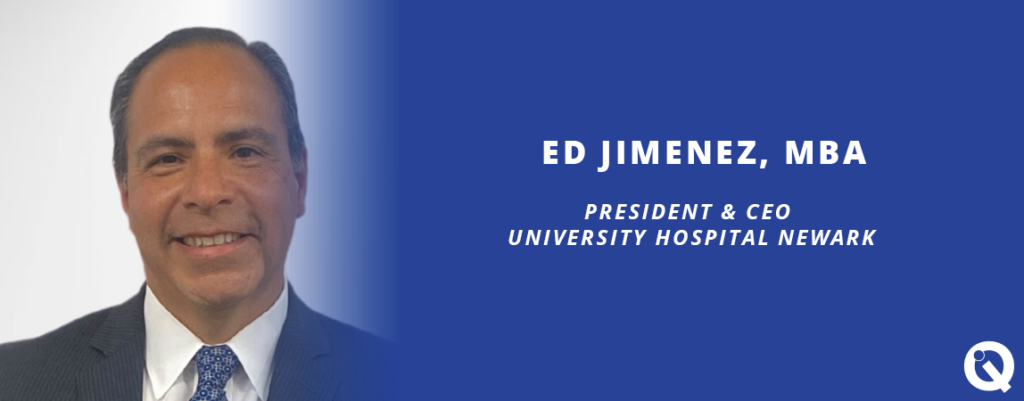Ed Jimenez, MBA, is the new president and CEO of University Hospital in Newark, a member of the Quality Institute’s Provider Council.
You recently served as CEO of University of Florida Health Shands Hospital and held leadership positions at Memorial Sloan Kettering Cancer Center and St. Joseph’s Healthcare System. You also spent two years at the University of Medicine and Dentistry of New Jersey (now University Hospital) in the early aughts. As you return to New Jersey, what are the significant changes you see in the hospital landscape?
Eighteen years ago, when I was at University Hospital, there were more standalone health care hospitals and institutions. There has been considerable consolidation as we’ve watched systems form and collaborate. The next change is that there were three medical schools in our state; now there are at least five by my count. And more hospitals are doing research and training future physicians. Institutions are trying to become more academic, and that doesn’t change places like University Hospital, where the hospital, medical school, dental school, and school of public health are on the same campus.
In the past few years there’s been a necessary and intensive focus on improving Black maternal and infant health. What will you do at University Hospital to address the unacceptable inequities?
University Hospital is leading the way. A national research paper looking at only Medicaid patients and maternal death found that even if people have the same health insurance the racial disparities persist. At University Hospital, it is not infrequent that we will get a mother very late in their gestation who then may have a bad outcome. You say, “How could this have happened in their community? … They came to us too late.”
The fragmented nature of care lends itself for, every once in a while, having a bad outcome. The other thing is we need to get out to obstetricians, community health workers, and community leaders across our different communities and have care started there. Hospital care often starts somewhere in the middle to the end of care. I think you’ve got to get to doctors who are taking care of community members and then you take it from there. It’s about community impact.
As one of the state’s premier teaching hospitals, how is University Hospital embedding Diversity, Equity, Inclusion and Belonging into its delivery of health care services and as well as clinical training?
The advantage we have of being in a large city is that we already have on a daily basis, connections, interactivity and exposure to a variety of different types of employee populations and community populations. And because of that, every day we become better and every day we become more knowledgeable about how to be sensitive to things such as the delivery of care … but also, how do we interact and advance our employees? How do we interact and connect to the community? And then how do we put all those things together? When you have a diverse employee base, when you have a diverse patient population, when you have a diverse community, you are already ahead of the curve.
The Quality Institute is the regional leader in New Jersey for The Leapfrog Group, which issues the Leapfrog Hospital Survey and Safety Grade. How are you focusing on improving patient safety?
If you look at University Hospital’s journey over the last five or six years, it’s not that long ago that our grade was an F. University has been on a journey to improve and, in a reasonably short period of time, it’s already up to a C and knocking on the door of B. We will put focus on hospital acquired conditions, in particular central line infections, urinary tract infections, C. diff. There are things we’ve improved dramatically on for the last five years: communication with doctors, responsiveness of the hospital staff, those things every year keep improving. So those are on the right journey. The hospital acquired conditions have stalled. We made great progress and then kind of leveled off, which from a managerial perspective is perfectly normal. You can only work so hard and change things before you have to settle down again and then you take the next level. I’m confident that over the next couple of years we’ll see those improve dramatically.
Finally, we like to ask a question beyond each person’s professional life. What is your favorite New Jersey artist — of any kind?
Jon Bon Jovi. I’m fortunate. I have a loving wife and I have three loving children who all recognize that because of what I do, that I miss things in life. But despite that, they’ve learned to love who I am. And anyone who reads about Bon Jovi and his family can appreciate his focus on family, and I admire that. He’s a Hall of Fame artist, and I also appreciate his charity work in New Jersey.

